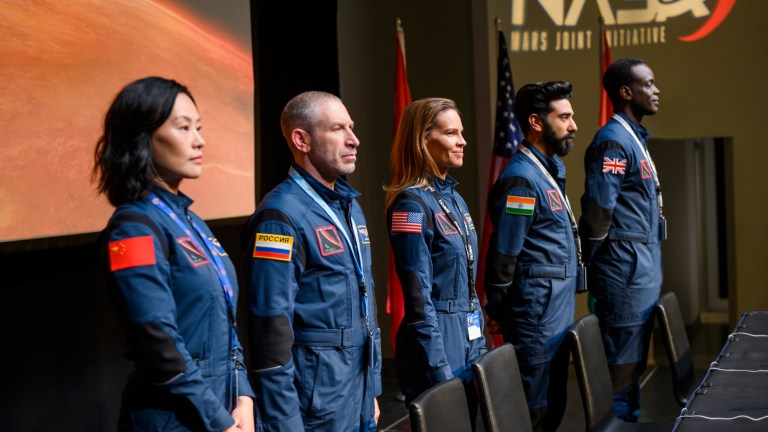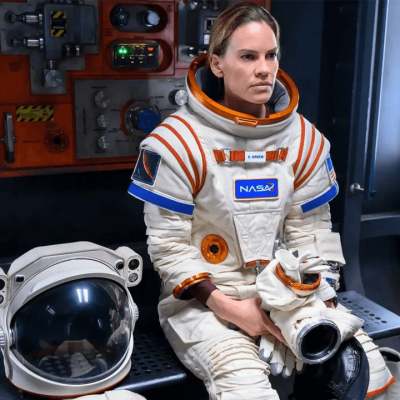How Netflix’s Away Became A Surprisingly Timely Tale of Human Connection
Away showrunner Jessica Goldberg talks about how why the space series feels so especially timely for those of us currently stuck on Earth, and what we might see in a second season.

The production team behind Netflix’s Away couldn’t possibly have known while they were making the show that it would release in the middle of a global pandemic, at a time when much of the world would be as isolated as any astronaut on a long journey. But sometimes, stories arrive precisely when people most need to hear them, and this heartfelt tale about the power of science and human connection feels right on time.
Away follows the aspirational story of the first manned trip to Mars on a spaceship called the Atlas, staffed by a diverse international crew from a variety of backgrounds. And though their eighteen-month journey to the Red Planet is full of conflict and life-threatening space crises, it’s the small gestures of kindness, patience, and trust that ultimately build bonds between them. After all, they’re literally all they’ve got.
In a time when our own humanity is struggling through a similar journey of pain and separation, Away is a remarkably comforting reminder that humanity’s best moments have always come when we work together in the service of something that is ultimately greater than ourselves.
“I’m just so moved that people are moved by the show,” showrunner Jessica Goldberg says. “From the response I’ve gotten from people from all walks of life and on Facebook and people [I] went to high school with, I do feel like it is touching a chord.”
Now more than ever before, viewers can relate to the idea of extended separation from family and friends – we’re living it every day thanks to the coronavirus pandemic. And the questions that Away poses about isolation and connection feel more relevant than ever in a world stuffed to the gills with Zoom calls and socially distanced birthday parties.
“We finished shooting, then we’re editing and then suddenly the world shut down. [Everything] just completely changed and the sort of probing question of how do we stay connected to each other felt all the more resonant,” Goldberg says. “I’m watching these episodes like, oh my gosh, this is how I’m talking to my mother on the iPad now.”
Read more
Away was initially inspired by a 2014 Esquire piece of the same name, which profiles astronaut Scott Kelly, who spent a year aboard the International Space Station.
“It’s so beautiful,” Goldberg says. “It’s about Scott Kelly on the space station when (Former Arizona Representative) Gabby Gifford – his sister in law – was shot. And he has this moment where he talks about how being in space is the best of humanity, and what happened on the ground is the worst of humanity.”
The Esquire piece was optioned by Jason Katims (Friday Night Lights, Parenthood) and Matt Reeves (Dawn of the Planet of the Apes, Felicity) who tapped playwright Andrew Hinderaker to pen a pilot installment. According to Goldberg, she was struck “by the idea of people coming together to promote exploration and science…the best of humanity” and signed on to take part.
In our current era of Peak TV, the idea of hope can feel like something of an antiquated concept. The small screen is full of antiheroes and bleak plots, where the devils of humanity often triumph over its better angels. According to Goldberg, Away is a very deliberate answer to that kind of storytelling.
“Everybody’s going dark, so why not do the opposite?“ Goldberg says. “It’s not cynical, it’s not dystopian. [It’s a show] you can watch with your family. You can cry together.”
There’s always been a feeling of transcendence associated with space and the possibilities of exploring worlds beyond our own. (Looking at you, Star Trek!) And that sort of hopeful tone seems more necessary than ever right now.
“[We’re] in this moment where everything is so divisive,” Goldberg says. “We’re trapped in our homes, there’s a real feeling of helplessness. This [is a] fantasy of the world working together – for science, for ingenuity, the love that they have for their fellow man. It’s bursting with humanity.”
Over the course of the series, U.S. Commander Emma Green (Hilary Swank), must find common ground with a grizzled Russian cosmonaut (Mark Ivanir), an emotionally closed off Chinese chemist (Vivian Wu), a British botanist (Ato Essandoh) whose faith sustains him among the stars, and a second in command who may or may not have a crush on her (Ray Panthaki). Though these people initially have little in common beyond their status as astronauts, they must eventually learn to trust and rely on one another, if for no other reason than their lives may one day depend on doing so.
“Mike Massimino the astronaut [told us] it’s like war,” Goldberg explains. “When you go out into the field you have to know this person is going to have your back and carry you. Anything could happen out there.”
Though Away has yet to be renewed for a second season, it’s consistently high rankings in Netflix’s Top Ten are certainly an encouraging sign that this series is reaching a significant audience. And according to Goldberg, any season 2 will continue to explore similar themes of family, both found and biological; the excitement of exploration; and the power of science.
“Mars is like going to the Grand Canyon on crack, you know – the possibility for adventure, exploration, just [everything that] we could learn is so vast. And, now that we’re in these deep relationships with these characters, I want to know what’s going to happen to them, how their relationships with Earth are going to get more strained.”
But though the series’ first season was a warm tale of human connection, its future installments will, by necessity, take a darker turn. After all, the crew of the Atlas will not only have to survive on an alien and hostile planet, they’ll have to wrestle with the larger implications of what their exploration will ultimately reveal about our own future.
“Telling a story like this, you also get into global warming eventually. The story Mars tells us about our own planet is so remarkable and so prescient and we have to look at Mars as that their atmosphere burned up. It once looked like Earth. What does that mean?”
Yet, if the first season of Away is any indication, this isn’t the sort of show that will lean into the innate hopelessness of that kind of story, but rather how we can solve it. In this world, Mars is more likely to point us toward our own salvation, rather than our destruction – and leave us all the better for it.

